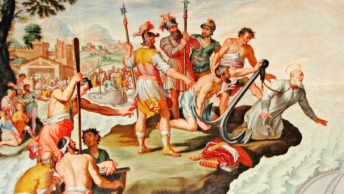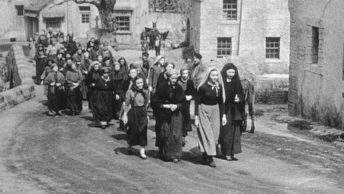Several hundred years ago in England, there was a wealthy couple who owned a large castle and had many servants. Their only daughter was used to being the center of attention, and was in fact a bit spoiled. Just after she turned eighteen, her parents died, and she inherited the family estate. The young woman was somewhat sad about her parents, but she was too busy enjoying her wealth and importance, and taking pride in her social standing, to be greatly upset. One day the daughter of a stonemason from the nearby village came to her in great haste, begging her ladyship to come at once to her father, who lay on his deathbed, as he had something very important to tell her. The self-centered young woman refused to go, thinking to herself, “What could a lowly day-laborer have to say to me? I’m not going to demean myself by rushing off to his poor hovel; after all, I have to keep up appearances.”
The daughter was dismissed without succeeding in her mission, but an hour later she was back, and in great urgency she said, “My lady, I beg you to come at once, and quickly. My father just told me that some years ago, during the war, your mother had him create a hiding place in the walls of the castle, and there she placed a large quantity of gold and silver and had him wall it up. Your mother made him promise not to reveal this secret to you until you were twenty years old, but as he’s about to die, he wishes to reveal to you the location of the treasure right away.” Hearing this, the young woman’s attitude immediately changed, and she rushed to the stone-mason’s home, but it was too late—he died minutes before her arrival. The lady was dreadfully annoyed, and she had the walls of the castle broken into and searched in many places, but always in vain; the treasure was never found (Spirago, Anecdotes and Examples from the Catechism, p. 123). So it is with those who ignore important messages intended for their own well-being. Jesus invites us to His Kingdom, but the invitation isn’t open-ended. We have to respond by the deadline, whenever that might be—and there is no higher priority than that.
When ancient peoples wanted to talk about the joys of heaven and of membership in God’s kingdom, they often spoke of food and of being present at a great banquet. This image was used, first of all, because heaven is otherwise very hard to imagine and describe, and secondly, because for most people, the possibility of going hungry or even starving in a famine was a very real part of life. St. Paul himself had some experience of this when he was in prison. Prisoners were not fed by their jailers; they had to arrange for their families or friends to bring them food in jail, or they didn’t eat. Therefore, Paul was grateful to his converts at Philippi who sent him food and other essentials while he was in prison, and promised them that God would reward their generosity. The prophet Isaiah says that the Lord provides for His people, regardless of nationality or race, and blesses those who answer the call to discipleship by practicing charity and compassion. On His holy mountain the Lord “will destroy the veil that veils all peoples, the web that is woven over all nations. . . .” This veil or web is one of selfishness and suspiciousness of those who are different from us, for God’s kingdom will be an experience of unity, not division. In the Gospel Jesus takes Isaiah’s image and expands it into a wedding feast, but He emphasizes the tragic but undeniable truth that there are many who ignore or even violently reject God’s invitation, or who attempt to respond only on their own terms. Our Lord warns us that because the kingdom of God is so wonderful, entering into this heavenly banquet is the greatest blessing we can ever experience—and, therefore, missing out on it is the worst tragedy imaginable.
When we look at this truth from Christ’s point of view, its personal urgency and importance for every human being is undeniable; the problem is, many people look at the realities of death, judgment, and eternity from their own foolish or shortsighted perspective. We might wonder how this could possibly be, yet there are those who—like the self-centered young lady on the family estate—choose to believe that lowly servants of God have nothing of value to say to them. For many people, Sunday is all about sleeping in, or going out golfing or hiking or engaging in other outdoor activities, or shopping, or watching football, or making extra money by going into work; the idea that Sunday is supposed to be primarily about worshipping God by attending church, never occurs to them—or, if it does occur to them, isn’t taken seriously. Many other people believe that the purpose of life is to become wealthy, powerful, and comfortable; the ideas of sacrifice, repentance, and obedience to God don’t have much of a place in their value systems. Even worse are all those who knowingly and deliberately engage in violence and immorality, despising the Gospel and trampling over anyone who gets in their way. All these people are ignoring or rejecting God’s invitation to eternal happiness and setting themselves up for a terrible fate, in which they’ll wail in misery in the midst of eternal darkness. Rather than judging or condemning them, however, we must pray for their conversion, and make sure we ourselves are truly answering Christ’s call and responding before the deadline expires.
Does Jesus come first in our lives? Is membership in His Kingdom so important to us that we’ll make any sacrifice necessary in order to achieve it? Do we truly make our faith in Him a priority? The Lord doesn’t want us becoming smug or complacent, and that’s why His parable is addressed not only to the chief priests and elders of His day, and to religiously indifferent sinners of our own, but to each one of us. Jesus expects us to attend Mass every weekend, to pray for at least a few minutes every day, to treat others as we wish to be treated, to forgive those who sin against us so that our own sins may be forgiven, to admit our faults and use His grace to try to overcome them, to share our faith with others when we have the chance, and to do our best to be His faithful disciples. He promises that our efforts will be rewarded on a scale far beyond our imagining, but warns us this invitation isn’t open-ended. Instead of imitating the haughty young woman whose self-centeredness caused her to miss out on a treasure, we must be like those wedding guests found worthy of attending the banquet given in honor of the king’s son. This is the reason God created us, and preparing ourselves for this destiny is our purpose on earth. We are invited to live forever in heaven—and whether we gain everything, or lose everything, depends on how we respond.








